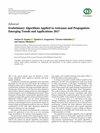一种用于视网膜癌细胞检测的非接触式小天线传感器
IF 1.1
4区 计算机科学
Q4 ENGINEERING, ELECTRICAL & ELECTRONIC
引用次数: 0
摘要
提出了一种新的无创便携式眼部肿瘤诊断系统。该系统使用非接触式小型天线传感器来检测视网膜癌细胞。天线传感器工作在ISM (Industrial, Scientific, and Medical) 2.413 GHz频段,电气尺寸为8 × 16.2 × 0.35 mm3。天线传感器是在可生物降解的Teslin衬底上制造的,并在模拟眼睛的模型中进行了测试,以比较数值计算和测量结果。在1g组织条件下,近场和远场比吸收率分别为1.18 W/kg和0.353 W/kg,在10g组织条件下,比吸收率分别为0.112 W/kg和0.313 W/kg。此外,利用天线传感器、共振频移和无监督机器学习技术对模拟和测量结果进行主成分分析(PCA),实现眼部肿瘤的检测。3.5 mm半径肿瘤的共振频移为单个肿瘤70 MHz,双肿瘤120 MHz。PCA在二维图的正负两侧生成有和没有肿瘤的聚类。所提出的技术在区分健康和恶性组织方面更有效。提出的系统方法可能成为早期检测眼内癌细胞的便携式平台。本文章由计算机程序翻译,如有差异,请以英文原文为准。
A Contact-Less Electrically Small Antenna Sensor for Retinal Cancer Cell Detection
A new noninvasive and portable diagnostic system for detecting ocular tumors has been proposed. The system uses a contact-less electrically small antenna sensor to detect retinal cancer cells. The antenna sensor is operated in the ISM (Industrial, Scientific, and Medical) 2.413 GHz band and has electrical dimensions of 8 × 16.2 × 0.35 mm3. The antenna sensor is fabricated on a biodegradable Teslin substrate and tested in an eye-mimicking phantom to compare numerical computations with measurements. The specific absorption rate (SAR) obtained at near and far-field distances under 1 g of tissue is 1.18 W/kg and 0.353 W/kg, and that under 10 g of tissue is 0.112 W/kg and 0.313 W/kg, respectively. Furthermore, to detect the ocular tumor using the proposed antenna sensor, the resonance frequency shift, and the unsupervised machine learning technique, principle component analysis (PCA) is employed on simulated and measured results. The resonance frequency shift for a 3.5 mm radius tumor is 70 MHz for a single tumor and 120 MHz for double tumors. The PCA generates clusters with and without tumors on the positive and negative sides of the two-dimensional plot. The proposed techniques are more impactful in distinguishing between healthy and malignant tissues. The proposed systematic approach could be a portable platform for early detection of cancerous cells inside the eye.
求助全文
通过发布文献求助,成功后即可免费获取论文全文。
去求助
来源期刊

International Journal of Antennas and Propagation
ENGINEERING, ELECTRICAL & ELECTRONIC-TELECOMMUNICATIONS
CiteScore
3.10
自引率
13.30%
发文量
158
审稿时长
3.8 months
期刊介绍:
International Journal of Antennas and Propagation publishes papers on the design, analysis, and applications of antennas, along with theoretical and practical studies relating the propagation of electromagnetic waves at all relevant frequencies, through space, air, and other media.
As well as original research, the International Journal of Antennas and Propagation also publishes focused review articles that examine the state of the art, identify emerging trends, and suggest future directions for developing fields.
 求助内容:
求助内容: 应助结果提醒方式:
应助结果提醒方式:


